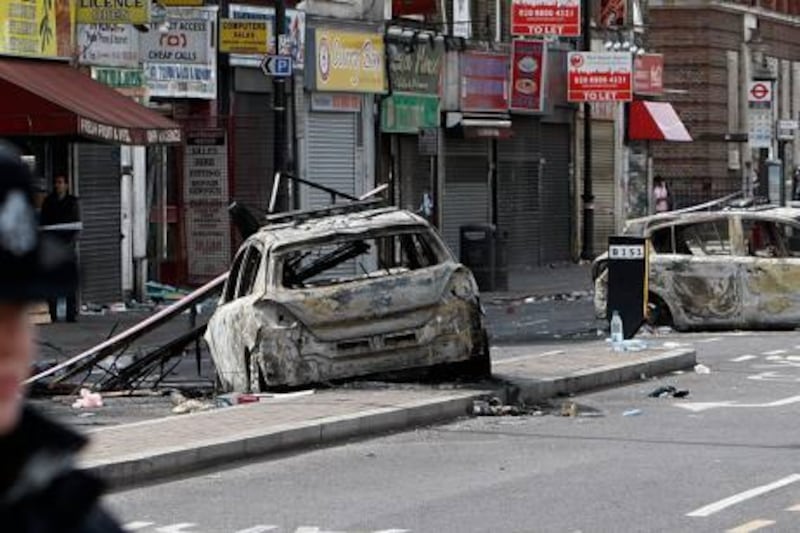LONDON //Britain's politicians and leaders have hit out at the riots that raged across parts of the capital for two consecutive nights.
The violence kicked off following protests on Saturday against police shooting dead a 29-year-old black man.
Police blamed criminality for the unrest in north, east and south London on Sunday night, following more sustained rioting on Saturday.
But wider questions are being posed about whether it was linked to poverty, austerity cuts or a breakdown in social responsibility following a series of scandals involving parliament, police, the media and financial sector.
Nick Clegg, deputy prime minister, said the violence had nothing to do with initial protests against the shooting death.
"It was needless opportunistic theft and violence, nothing more, nothing less and it is completely unacceptable," he said. "The people who have suffered are those who have lost their businesses, shopkeepers who have lost their shops."
Police have arrested 160 people and blamed "copycat criminal activity" for Sunday's violence, in which hooded and masked young people looted and set fire to shops and attacked police in deprived neighbourhoods in Enfield, Islington, Walthamstow and Brixton.
The latter is just marking the 30th anniversary of sustained rioting that took place in 1981.
The latest unrest started on Saturday night in Tottenham, north London, when a vigil for Mark Duggan, who was shot dead by police on Thurday, turned into a riot.
Police officers were injured and thousands of pounds of damage was done to businesses and homes. Duggan had been travelling in a minicab when it was stopped by police officers who specialise in combatting gun crime.
On Sunday night, social media and instant and text messaging was used to draw people together at flashpoints, police said.
In central Brixton, pavements and roads remained cordoned off yesterday morning as residents tried to understand why shops and fast-food restaurants were looted and burnt in their own neighbourhood.
"In the Arab Spring, people were trying to get their freedom. What are they trying to get here when they attack their own and steal trainers and TVs?" said Chris, a black man in his early 20s who did not want to give his surname.
"Maybe they see the bankers and politicians get away with theft, maybe the police need to do more to improve relations and maybe the government just has to think about the poor as well as the rich."
There was widespread criticism of prime minister David Cameron for not cutting short his holiday in Italy to deal with the crisis.
Theresa May, home secretary, was due to return from her summer break yesterday to hold meetings with senior police officers.
Mr Clegg, Liberal Democrat leader, said senior members of the coalition government had been in regular telephone contact.
"I reject completely this notion that somehow this government hasn't been functioning very effectively," he said.
His assertion was rejected by Clarence, a 25-year-old computer engineer in Brixton.
"The government and police don't care about us," he said. "It's not to say it's OK to steal or destroy but the authorities need to wake up and see that we're the ones stuck here and not on holiday."
The police promised a "momentous operation" to track down those responsible for the violence.
The opposition Labour party has vowed to continue to link the riots with public sector cuts, making the issue more associated with class division rather than racial hatred.
"We also need a clear strategy from the government and the mayor to prevent this disorder becoming a repeated problem throughout August and September," said Yvette Cooper, Labour's home affairs spokeswoman. "That means looking swiftly at the capacity of the police and of prevention programmes, both of which are facing considerable resource pressure."
Kit Malthouse, deputy mayor for policing in London, denied there were any gaps in police decision-making following last month's resignations of London's two most senior police officers who, along with many politicians, became linked to the phone-hacking scandal at Rupert Murdoch's media group and widespread allegations of impropriety.
Mr Malthouse said people were using the shooting of Duggan to steal "a new set of trainers or whatever it is" and defended police tactics. "We can't just maintain a standing army sitting in vans all over the place just in case something might kick off," he told Sky News. "We have to employ those officers as efficiently as possible."
Many residents of Brixton, already fearful after Sunday night's events, hoped the violence would be contained and not become part of a long summer of discontent.
"It was a like a war zone, with helicopters using searchlights to hover over us," said Mark, who bought a house in Brixton about five years ago as part of a wave of gentrification seen in some parts of the area.
"This can't go on," he said.
sdevi@thenational.ae






